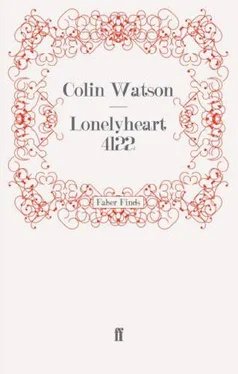“I say...” He withdrew his hand and stared at where it had been. “You’ve got some muscle, haven’t you?”
Miss Teatime straightened her skirt. “I do try and keep in trim, as a matter of fact. Just a few toning up exercises.”
His air of bright purpose returned. “Did you write that letter?”
Opening her bag and holding it so that the map she had bought that morning stayed out of sight, she took out an envelope and handed it to him.
“The cheque is there as well,” she said. “I have made it out to the daughter just in case there is some difficulty in Mr Cambridge’s dealing with it in hospital.”
He nodded. “Very sensible.”
The envelope was unsealed. He drew out the letter and began to read.
Dear Evelyn [Miss Teatime had written],
This is to introduce my good friend, Commander John Trelawney, who has kindly agreed to act on my behalf in the matter of the boat. He will hand you my cheque, which, as you will see, is for five hundred pounds (I wish you would let me make it a sum nearer the true value of the Lucy, or even half of it, but it seems that you and your father have made up your minds). Please give Commander Trelawney the receipt, and also the boat’s manual and the other documents—of which you will know more than I—and take him to the mooring. He is going to sail the Lucy here himself (a task for which I could scarcely have chosen anyone better qualified than a one-time Naval officer!) and he will wish, of course, to satisfy himself that she is in good condition for the voyage. I think there is nothing much to add, except perhaps the telephone number of my hotel (Flaxborough 2130), in case you wish to ring me about any details I have forgotten to mention. I do hope and pray that the money, ridiculously inadequate as of course it is, will be of some immediate use in easing your troubles.
Yours sincerely,
Lucilla.
Trelawney looked up. “I should say she is very lucky to have such a good friend,” he said solemnly.
“Just as I am,” replied Miss Teatime, with no less sincerity.
He put an arm round her shoulder and squeezed in a comradely fashion.
“Now how do I find this good lady?”
“Do you know Twickenham?”
“Only as a rugger ground, I’m afraid. I used to go down for the navy matches whenever I happened to be ashore.”
“I do not think that would be very near where the Cambridges live. Their address is on the envelope, by the way. It is a rather nice old house in a place called The Turnills. Number eight. It is not so much a street as a sort of close, with the river at the lower end. Ask anyone for the old part of Twickenham and you should have no difficulty in finding it.”
“Is there a station handy?”
“Your best plan probably will be to go to Richmond Station and cross the river. It is a pleasant walk and not very far.”
“Fine.” He put the letter in his pocket.
“When do you intend to go?”
“Tomorrow morning. There’s a London train just before ten o’clock.”
“I shall see you off,” announced Miss Teatime, with an air of sudden decision.
“Oh, you don’t need to trail round specially for me.”
“But I shall, Jack. I know you are going up by train, but I cannot help thinking of you as embarking on a voyage. After all, it will be a voyage back—a real one. Are you not afraid of storms?”
Trelawney could not help laughing. For a moment, Miss Teatime looked abashed, then she joined in his amusement.
“You must think of me waiting here like Madame Butterfly,” she said. “I wonder if there is a hill top from which I can watch out for you.”
“O-o-one fine da-a-ay!” sang the commander, not to be outdone in drollery.
Miss Teatime sighed. “It all seems like a dream,” she murmured.
“Yes, doesn’t it...”
“It sleeps four, you know. She does, rather.”
“She?”
“The Lucy. And there is the loveliest little kitchen.”
“Galley, my dear.”
“Of course. Galley. You will not believe this, but I am really a very good sailor.”
“I do believe you.”
“Do you think we shall be able to sail in her all the year round?”
He smiled. “Hardly. At least we shall have to winter in our cottage.”
“Yes, the cottage...Tell me about the cottage, Jack.”
“You shall see it for yourself very soon. White walls thatch—little windows under the eaves. And central heating!”
“Marvellous!”
“And scarcely a soul within hail.”
“Whereabouts is it, Jack?”
“You’ll see.”
“Tell me.”
“That’s enough, my girl. You’re sailing under sealed orders. Just leave everything to the navigator!”
“What an old tease you are!”
That evening, after she had waved goodbye to Trelawney when he looked back from the other side of the ticket barrier, Miss Teatime did not immediately leave the booking hall. She waited, listening for the arrival of the Brocklestone train. Only when she had heard the last of its departing coaches rattle over the level crossing at the station’s east end, did she walk out into the forecourt and make her way to the car.
She got in and put the map on the seat beside her, together with the list of the train’s stopping places.
The first of these was Pennick, a village just beyond the outskirts of Flaxborough, whose expansion would eventually absorb it as a suburb.
The Pennick road ran almost parallel to the railway. Its first mile, while fairly free of traffic at this time of the evening, was lined with houses and shops. It was within the speed restriction area, and Miss Teatime was careful to observe the limit, give or take twenty miles an hour, until she saw the crossed white discs at the beginning of a comparatively sparsely built-up stretch of ascending road. Then she let the Renault hum happily into the eighties.
A series of three sharp double bends constrained her to drop gear and halve the car’s pace, but on emerging from the last corner she found herself at the start of a straight descent into Pennick village.
The station could be seen quite clearly. It stood on its own, a little to the right of the village and connected to its main street by a fenced path. The train from Flaxborough was just drawing in.
Ten seconds later, Miss Teatime’s car stopped precisely opposite the station path.
The first passenger was coming out of the door of the little booking office. A woman, carrying a shopping basket. Two young men followed, then another woman with a little girl. No one else. Behind a window in the station, a shutter-like movement of light and shade grew faster and faster; then suddenly the window showed clear daylight. The train had gone.
Hambourne was its next stop, about two miles farther on. The map suggested the road to be fairly free of complications. Miss Teatime set off again.
Once beyond the last of Pennick’s cottages, she saw with surprise just how straight the road was. It might have been built as a third rail track. Hambourne was actually in view, a tiny cluster of russet-coloured roofs, glowing in the last of the sun.
Here it would have been simple enough to pass the train, but she decided against doing so. Rail passengers had nothing to do except look out of their windows and even at twenty or thirty yards it was not difficult to recognize the driver of an overtaking car. So she drove slowly into Hambourne and again was able to pick a vantage point near its station before any travellers made an appearance.
There were two. Neither was the commander.
She drew another blank at North Gosby.
Between there and Strawbridge, she encountered an almost disastrous hold-up in the form of a flock of sheep that was being driven along the road to fresh pasturage. This lost her five minutes, and only a hazardous, if exhilarating, passage through Gosby Vale at a fraction over ninety saved her from missing Strawbridge’s homecomers altogether.
Читать дальше












